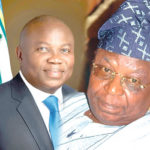While the message of Hope brought relief to many, it has been suggested that coming out of recession was not the worst being over, but what happen after recession, thus the discussion at the CEO Roundtable with the theme “Innovating out of Nigeria’s Recession: Exploring New Paradigms for Nigeria’s Economic Growth”
At the event organised by the Nigerian Stock Exchange (NSE) and Bloomberg in Lagos on Friday, the economic policy makers in the country were being charged to focus on growth that is sustainable, sustained and inclusive as this would determine how innovative the country comes out of recession.
Giving an economic Roundup, Dr Doyin Salami, a notable economist and a senior lecturer at the Lagos Business School (LBS) explained that defining the role of Private Capital and its protection, would be key to Nigeria’s economic recovery, considering the need to attract private investments to drive the economy.
“For me, this is important because if the economy of Nigeria is to grow, and do so rapidly and sustainably, then it’s going to rely on private capital. If we do not assign roles to private capital, we will not protect the private capital. If we do not protect the private capital, then we will not get private capital,” he said.
He noted that the country’s major economic challenge was unemployment and productivity, which would require the government to create an enabling environment for the private sector to participate actively, thereby creating jobs.
He added that to create jobs for the unemployed, the government also must look into ways it would take consumer and other corporate businesses out of pressure.
The Minister of Finance, Mrs Kemi Adeosun, in her keynote address affirmed that through the Economic Recovery and Growth Plan (ERGP), the government was committed to steering Nigeria from the current recession, and leading it to the path of growth.
She noted that the area of focus would be providing enabling infrastructure, promoting an effective public-private partnership model and driving robust revenue generation.
On the public-private partnership Adeosun assured stakeholders that the framework will be reworked and the outstanding legacy issues will be resolved to attract private capital into the economy.
She said federal government intends to revive Public Private Partnership (PPP) and revive existing and failed PPP projects.
Adeosun noted that the country’s private sector is extremely efficient, creative and resilient but it needs predictability in policy.
“We will introduce new assets clause of guaranteed instruments that will provide adequate safeguard for the protection of private capital,” she said.
Members of the panel also reiterated need the need country to define proactive ways to shore the economy.
Chief Executive Officer of OutsideHR, Ngozi Adebiyi, explained that to innovate, Nigeria would need to build the human capacity of Nigerians, adding that the system would need to teach people out to innovate through entrepreneurship.
Managing Director of Okomu Oil Palm Company, Graham Hefer, however believed that Nigerian youth could tap into opportunities in the agricultural sector, noting that they may not necessarily innovate but look into what is being done successfully in other African countries in Agricultural revolution and replicate same in Nigeria.
On his part, Demola Sogunle, Chief Executive Officer of Stanbic IBTC, said beyond innovation, it was critical to also look into the value of the innovation, emphasising that the value chain of such business must be carefully studied to facilitate growth, as many business initiatives may not add value to the nation’s economy.






